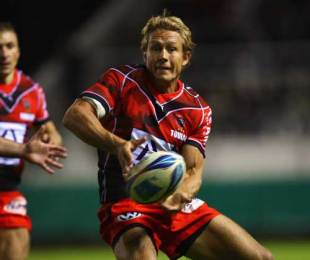|
Comment
England must show progress
Hugh Godwin
October 28, 2009

Toulon's Jonny Wilkinson - fuelling debate
© Getty Images
Enlarge
There is a particular pleasure in the chit-chat and conjecture that springs forth when a series of England Tests draws near, not least the hand-wringing in the press which goes on about the likely make-up of the team. The role of the media is to play agony aunt to all and sundry - to Martin Johnson, to the Premiership club coach who has lost half his front-row while league matches continue, to the mystified player seen to be outside Johnson's inner sanctum, and so on. Meanwhile the happy punter with a Twickenham ticket is probably busier setting up his or her social engagements - which pub to meet in at lunchtime, where to go in Richmond afterwards, that sort of thing. But, of course, they will be just as intrigued or even excited that Jonny Wilkinson is about to return to the team (if indeed he is). I wonder how many of us would remember without checking that he was actually dropped (for Danny Cipriani) before his last international appearance against Ireland in the 2008 Six Nations? It is the lot of the dedicated rugby Sherlocks in the press to spend weeks making predictions based on a whisper here, a rumour there, or even a good old solid tip-off. By reading the runes, by hook or by crook we are keen to work out who will be in the team and what the selection says about the way England will play. There are a few loud-mouthed ex-player pundits who are paid to express an opinion and, hey, if they make a convincing argument for Duncan Bell to play on the wing, who among us can be quite sure Johnson will ignore them? Then the revised 32-man England squad comes along a fortnight before kick-off and we pore over it, wondering just how good our "insider" or own instincts proved to be. The media, in short, do the fretting and sweating so the public don't have to and I am certain that all these column inches and TV and radio hours help sell tickets and pay the coaches' and players' wages. It is a phoney war, I suppose, but a damned enjoyable one as it forces us not only to debate the whys and wherefores of Johnson's approach, and the state of English rugby at large. I was at Northampton last Saturday (a fortnight before England face Australia) and the esoteric ruminations in the press room over Courtney Lawes alone were something to behold. Might the 20-year-old get a Test call-up, and would he be worth 20 minutes on the bench, and was he a better bet than Leicester's Richard Blaze, and how would that affect the badly broken front-row?
While the debate goes on Johnson and the England coaches must stay calm. I saw Johnson at a sports journalists' lunch on October 1 and although Riki Flutey, Delon Armitage, Simon Shaw and Tom Rees were already injured, the national manager was able to speak with optimism of a team who had been mostly new to each other in the autumn of 2008 and had since spent "a big year together". He viewed England as a team developing nicely, thanks in part to mostly consistent selection amid the ever-present clamour for this, that or the other change to be made. And the signs had been gradually favourable during last season's Six Nations. The Irish players reported that England had given them their toughest work-out in their Grand Slam campaign. Against France and Scotland, there was a style emerging in which a solid set-piece laid the foundation for two or three phases of attacking the gainline through loose forwards or a big back, then playing from there with the head up and options open. This is a sensible way to combine England's foremost strength (now as it has always been) in the forwards with the likes of Armitage and Ugo Monye as dangerous runners. Two years out from the World Cup, the building blocks were in place. In the last few weeks a glut of injuries has savaged Johnson's beatific outlook. In addition to his first-choice fullback and inside-centre (remember, Armitage and Flutey had their Test debuts under Johnson), he has lost his first-choice loose-head and tight-head props Andrew Sheridan and Phil Vickery. He will also be without regular No.8 Nick Easter, and several other players vying for the right to be called first-choice: Harry Ellis, Rees, Lee Mears and Shaw among them. Others such as Mike Tindall - a possible starter against the Wallabies - have been teetering on the edge of withdrawal. Maybe all these players will be fit for the Six Nations in the New Year and the building blocks can be re-set. The challenge for Johnson as people wend their way to Twickenham in the coming weeks - whether head-scratching media or paying spectators - is to continue to prove that England are on the rise, no matter who turns up to play. © Scrum.com
| |||||||||||||||
Live Sports
Communication error please reload the page.
-
Football
-
Cricket
-
Rugby
-
- Days
- Hrs
- Mins
- Secs
F1 - Abu Dhabi GP
Abu Dhabi Grand Prix December 11-131. Max Verstappen ()
2. Valtteri Bottas (Mercedes)
3. Lewis Hamilton (Mercedes)
4. Alexander Albon ()
5. Lando Norris ()
6. Carlos Sainz Jr ()
-
ESPNOtherLive >>
Snooker - China Open
Tennis - Miami Open

